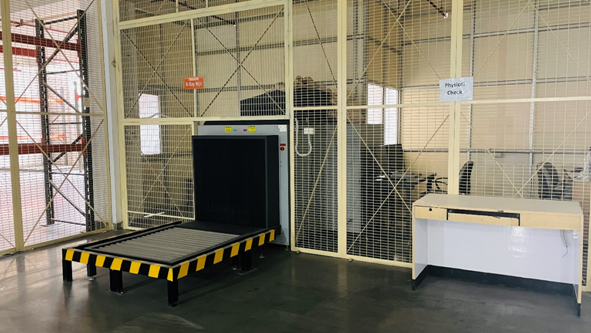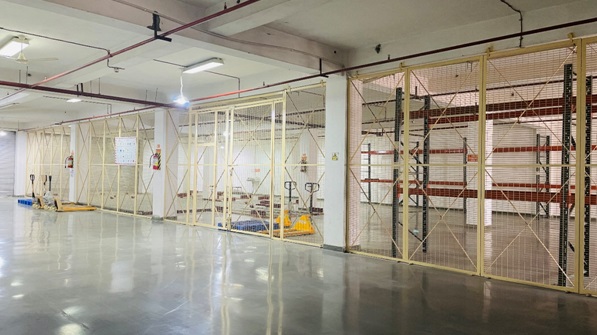
“This initiative will not only serve the immediate needs of the industry but also set a precedent for future developments”
Being in the industry for many decades, the leading industry player Continental Carriers Pvt Ltd is at the forefront of a groundbreaking development – the establishment of the first air freight station in India. In this exclusive interview with Apace Digital Cargo, Vipin Vohra, Chairman, Continental Carriers shares his valuable insights and experiences in spearheading this transformative project. Join us as we explore the future of air freight and the visionary leader behind this enormous initiative.
Could you please share the driving factors and vision behind the decision to develop the first air freight station in India under the banner of Continental Carriers?
The decision to develop the India’s first Air Freight Station (AFS) under the banner of Continental Carriers was driven by a combination of visionary thinking and a commitment to providing efficient cargo handling services.
Late Shri T N Vohra, Founder-Continental Carriers Group had a vision, in 1985, that foresaw the growth potential of Air Cargo transportation in India. He recognized that as the Indian economy will expand and global trade increased, there would be a growing need for efficient and specialized cargo handling facilities. Late Shri T N Vohra envisioned an off-airport facility because he understood that streamlining the cargo handling process, away from congested airports, could significantly improve efficiency. By processing cargo “Ready for Carriage” at the AFS, it will reduce the burden on the airlines& Airports to expedite the overall logistics process, benefitting both shippers and carriers.

His vision for India’s first Greenfield AFS also demonstrated a pioneering spirit who aimed to set an industry benchmark and contribute to the development of the air cargo sector in India.
This initiative will not only serve the immediate needs of the industry but also set a precedent for future developments in the sector.
Air freight involves the co-ordination of various stakeholders, including airlines, customs, and regulatory bodies. How do you envision managing these collaborations to ensure smooth operations?
Managing collaborations among various stakeholders in the Air Freight industry is essential for ensuring smooth operations.Successful collaboration among airlines, customs, and regulatory bodies is vital for the smooth operation of air freight. It fosters a culture of cooperation, by which the industry can enhance efficiency, reduce delays, and provide better service to customers.

The Transportation Management System (TMS) must be robust that allows for end-to-end visibility and control of the freight movement utilizing tracking and tracing systems to monitor the status of shipments in real time with cloud-based software solutions to enable easy access to information from any location.
As with any pioneering project, challenges are inevitable. What are the major challenges you foresee in the establishment and operations of the air freight station, and how do you plan to address them?
Establishing and operating an Air Freight Station (AFS) proved to be a complex and challenging endeavour. Continental Carriers Pvt Ltd’s experience in navigating these challenges is valuable for other logistics players for establishing the AFS.
Soon after, the first-ever AFS Policy was announced on 28th October 2014, Continental Carriers Pvt Ltd was the first Logistics Company to apply for the Green Field Air Freight Station. Since this was a new concept, Continental Carriers Pvt Ltd personally explained the features to the concerned ministries/organizations for seeking requisite clearance / NOCs.
Finally, the Ministry of Commerce approved it on 30th August 2016. Since then, it has taken Continental Carriers Pvt Ltd, close to a decade to complete this dream project.
Major challenge was the lack of clarity regarding the roles and responsibilities of different regulatory and facilitating agencies in the approval process.
Continental Carriers Pvt Ltd worked and coordinated closely with relevant ministries and agencies to refine the regulatory framework and ensure that all the requisite approvals/NOCs are granted for the establishment of AFS.
Sustainability is a growing concern globally. How does Continental Carriers plan to integrate environmentally responsible practices into the design and operations of the air freight station?
Integrating environmentally responsible practices into the design and operations of an Air Freight Station is crucial for reducing its environmental impact and contributing to sustainability goals.
Air Freight Station has been planned prioritizing energy-efficient design elements which includes natural lighting and high-quality insulation, and energy-efficient Air Conditioning systems. Proper energy management system is in place at the Air Freight system to monitor and control energy usage, optimizing lighting, heating, and cooling systems.
Continental Air Freight Station plans to use vehicles with low-emission/zero-emission to reduce their carbon footprint and ensures reduction in energy consumption by using energy-efficient lighting, heating and cooling systems in their its and warehouses.
Real-time tracking of cargo and vehicles helps Continental Carriers Pvt Ltd optimizes routes and reduce fuel consumption, leading to lower emissions and more sustainable operations.
While focusing on the first air freight station, do you have a long-term roadmap for expanding this model to other locations in India or potentially abroad?
Expanding the successful Air Freight Station model established by Continental Carriers Pvt Ltd at Kapashera, New Delhi, to other locations in India and potentially abroadrequires patience, persistence, and adaptability. Given the challenges faced during the establishment of the initial facility, it’s crucial to have a well-thought-out long-term roadmap to navigate potential obstacles and ensure smooth expansion.
Followingroadmap will be considered:
- Identify and document the challenges faced during the establishment of the Kapashera facility, particularly those related to regulatory approvals and unclear roles and responsibilities among regulatory agencies.
- Develop a robust regulatory compliance strategy based on the lessons learned from the Kapashera project. Engage proactively with regulatory agencies to ensure a clear understanding of their roles and responsibilities in the approval process.
- Once the model is successfully replicated in different locations in India, explore opportunities for international expansion. Research potential markets, regulatory requirements, and partnerships abroad.
By addressing regulatory challenges, learning from past experiences, and following a well-structured roadmap, Continental Carriers Pvt Ltd will definitely replicate its success in Kapashera, New Delhi at other locations in India and potentially abroad.
Over the years, the logistics and aviation sectors have evolved significantly. How do you perceive the future evolution of air freight, and what role do initiatives like the air freight station play in this evolution?
The future evolution of the Air Freight industry is likely to be influenced by several key trends and factors, and initiatives like air freight stations can play a significant role in shaping this evolution.
As global trade continues to expand, there will be an increased demand for air freight services. E-commerce, perishable goods, and time-sensitive shipments will continue to drive growth in this sector.
Airports in major cities are becoming increasingly congested, leading to delays and increased costs. Initiatives like Air Freight Stations, which allow cargo to be processed at off-airport locations, can help alleviate this congestion by reducing the number of cargo movements through the main terminals during peak periods.
Air freight can be expensive, especially for large or heavy cargo. Initiatives like air freight stations can help reduce logistics costs by offering more cost-effective handling and storage solutions compared to on-airport facilities.
As the air freight industry continues to grow, competition among cargo terminal operators will intensify. This competition can drive innovation and improvements in services, benefiting shippers and consumers.
Initiatives like Air Freight Stations, which can reduce congestion at airports and lower logistics costs, are in line with the industry’s need to adapt and evolve to meet these challenges and opportunities. By providing off-airport cargo handling and processing, they can contribute to a more efficient and competitive air freight sector.
How do you envision the air freight station contributing to the growth and efficiency of the logistics and transportation sectors in India?
The establishment of an Air Freight Station (AFS) in India can indeed play a pivotal role in enhancing the growth and efficiency of the logistics and transportation sectors in the country.
Airports in India, especially major ones, often face congestion during peak periods due to the high volume of cargo. By handling a significant portion of cargo at off-airport locations like an AFS, congestion at airports can be alleviated. This ensures smoother operations at the airports, reduces delays, and minimizes the risk of bottlenecks.
AFS facilities, located near airportsare equipped with advanced handling and storage infrastructure. Cargo after customs clearance, can be sorted, consolidated, and prepared for transport more quickly to the Airport, leading to shorter turnaround times for both import and export shipments.
The introduction of AFS facilities can foster healthy competition among cargo terminal operators. When multiple operators are vying for business, they are incentivized to improve their services, innovate, and offer competitive pricing. This benefits both the shippers and the overall logistics industry.
The AFS facilities will tap into the untapped markets in Tier II and Tier III cities and ensure optimum utilization of unused space at the Airports in these Tier II and Tier III cities.
These above-mentioned benefits collectively contribute to the growth and efficiency of the logistics and transportation sectors in the country, making it a valuable addition to India’s logistics ecosystem.




